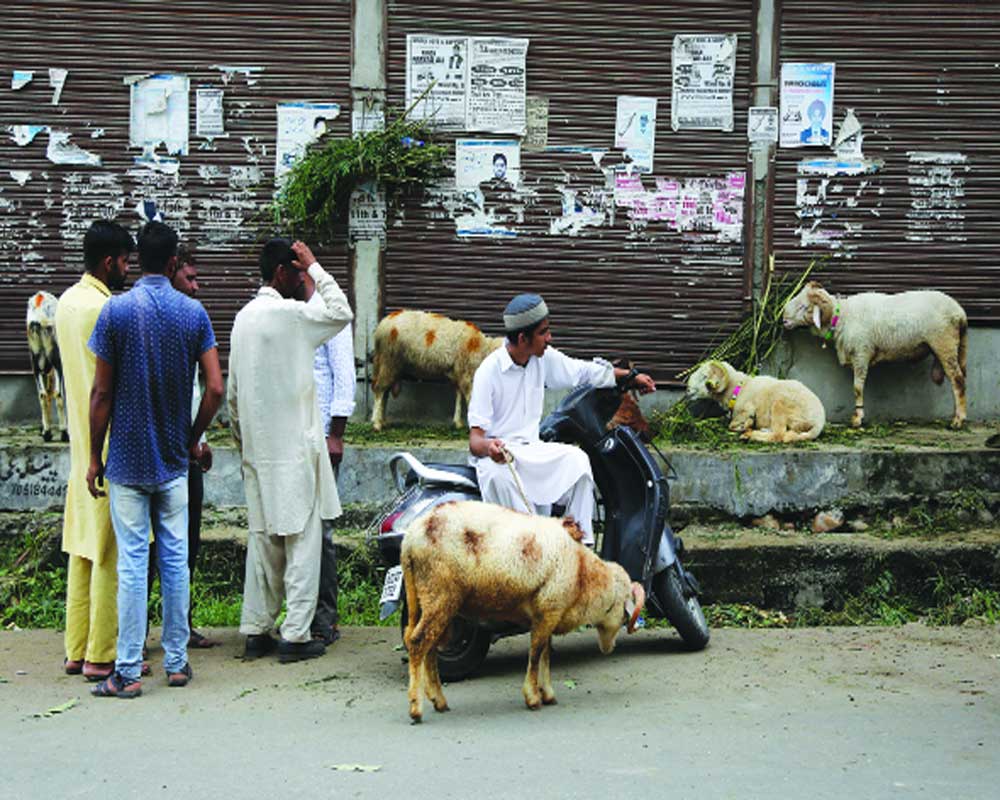The Govt’s tonal approach and response to ground reality will make all the difference between conflict and peace
There’s something inherently reassuring about the return of normalcy in the daily rhythms of life, people moving about in the streets, shopping for rations, visiting places of worship, children going to schools and the elderly taking their walks. Life, as it happens around us in its mundane beats, gives a strange sense of continuity and status quo. The Valley, which was traumatised into silence after heavy security deployment, the abrogation of Article 370 and its declaration as Union Territory, came out on the streets despite the overturning of what had so far underpinned its political existence. At least, people attempted to resume their social life as they knew it with the relaxation of restrictions, albeit under strict vigilance. Some of them even managed to speak to the Press despite the presence of security personnel, even sharing their repressed views and fears. Others lamented the lockdown had thrown life out of gear. Yet others went about shopping for Bakr-Id, hoping their sincere prayers would be heard and bloodshed would stop in the Valley. This is an uneasy truce, something they have lived with for years, but the inevitability of a changed status is new to them. And they do not quite know how to react. This is where Naya Bharat’s Kashmir doctrine will be put to test, whether the healing touch of socio-economics will win over the people’s hearts or not, whether the muscularity of a bold move will be complemented by an empathetic understanding of people’s needs, where majoritarians understand that yielding space and listening may deliver greater returns than expected and that a tectonic policy shift also entails a mindset change.
Of course, Prime Minister Narendra Modi’s outreach does talk about issues that matter to the ordinary Kashmiri — boosting growth, powering MSMEs, developing a tourism hub, opening institutions of excellence, marketing Kashmir’s heritage crafts, creating jobs and so on. Now translating them on the ground must be done judiciously. While Jammu might feel that it has been denied resources because of the special status to Kashmir for too long, it shouldn’t be seen as being rewarded so much that Kashmir feels the integration was just a political punishment. As a State, which was undoubtedly under-served economically and infrastructure wise, it still had been able to maintain some healthy growth indices. Because, though buying land as promised may seem like a whole new world, the fact is the 99-year lease model has worked for setting up existing businesses. While the nature of industries may be limited given the region’s Himalayan terrain and climate concerns, it can become a major pharmaceutical, medical and research hub with more knowledge-based units. The educated Kashmiri youth could become a national asset as they have proved their excellence, particularly in scientific disciplines, in the rest of India and abroad. Harnessing them properly and absorbing them in jobs could undoubtedly give us a talent pool but it’s a tough act considering there is joblessness in the rest of the country. It is difficult to demonstrate short-term gains in Kashmir where reclaiming peace will undoubtedly be a long journey. And without that stability, investment will just not come in. For starters, the re-organisation has pushed the civil society further away from us. And tainting politically-elected leaders as the nation’s disruptors and arresting them have distanced any hope of a return to consultative and consensual dialogue. They need to be coopted, not distanced, considering they have always chosen to side with democracy. Even the educated elite have through generations invested their faith in the idea of India than separatism, and so the Government must take care to ensure that trust is not misplaced. For the sense of betrayal could result in unimagined hitbacks. This requires a velvet glove approach considering the abolition of statehood has also meant a denial of their identity as they knew it. The mass protests by ethnic Muslims from Kargil are warning bells that bifurcation could trigger demands for further division and autonomy, resulting in unrest. The Government needs to have its ear stuck to the ground to anticipate implications and have a redressal mechanism in place. The panchayat model of devolution of power should now be systematically built up to local governance structures. Unrealistic imposition can never transplant realistic grace.


























